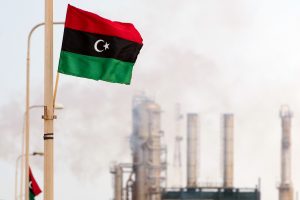
Four months after Libyan National Army (LNA) chieftain Khalifa Haftar began his assault on Tripoli, Libya is closer than ever to collapse. Haftar’s hopes for a swift seizure of the Libyan capital have unraveled due to stiff resistance from forces loyal to the United Nations-recognized Government of National Accord (GNA). Meanwhile, a panoply of international stakeholders—including China, Russia, Italy, France, and the Persian Gulf states—have become involved in the conflict, dragging it on. Although some of these actors cite the need to slow the flow of migrants from Libya to Europe or the hope of stabilizing Libya as rationales for foreign intervention, they’re also motivated by the prospect of lucrative reconstruction contracts.
The most bitterly contested contracts are in Libya’s oil industry, which is expected to double its production by 2023, and in infrastructure projects that leverage Libya’s strategic location on the Mediterranean Sea. For example, foreign powers are clamoring for dominance over the El Sharara and El Feel oil fields, which lie in southern Libya’s oil crescent; control of offshore oil deposits held by the GNA; and access to crucial ports, such as Benghazi and Ras Lanuf.
The balance of forces in Libya profoundly affects who will win what contracts. The United Arab Emirates, Saudi Arabia, Egypt, and France have supported the LNA’s military activities, and their economic interests hinge on the success of Haftar’s charge on Tripoli. Italy, Turkey, and Qatar have consistently supported the GNA and helped the U.N.-backed government resist Haftar’s territorial offensives. Russia and China have treaded cautiously in Libya and bet on neither party gaining a decisive advantage.
If the status quo, where the GNA controls Tripoli and its environs and the LNA dominates eastern and southern Libya, is formalized, Russia and China are poised to benefit the most.If the status quo, where the GNA controls Tripoli and its environs and the LNA dominates eastern and southern Libya, is formalized, Russia and China are poised to benefit the most. That is why they have advocated for maintaining this setup against other actors that would rather see the LNA or GNA emerge as the overwhelmingly dominant force.
And so, although Russia has been criticized for blocking a U.N. resolution condemning Haftar’s offensive on Tripoli and for allegedly deploying private military contractors in support of the LNA’s military activities, it has also maintained active relations with the GNA. This balancing strategy has economic foundations. Russia has printed dinars for distribution by Haftar’s parallel Libyan central bank, while the Russian energy giant Rosneft signed a deal to purchase oil from Libya’s National Oil Corporation in 2016.
Given these economic interests, the optimal scenario for Moscow is a peace settlement that ends the U.N.-enforced arms embargo against Libya and creates a frozen conflict. Prior to the overthrow of Libyan leader Muammar al-Qaddafi in 2011, Russia had $4 billion in arms contracts with Libya. Even today, the LNA’s air force relies extensively on Russian military technology, so Moscow would benefit greatly from the removal of the arms embargo.
Russia’s ability to balance favorable relations with the GNA and Haftar could also help Moscow land some much-coveted national infrastructure contracts. Russian companies are especially interested in constructing a railway linking Benghazi to Sirte, which would bolster Russia’s economic and geopolitical influence on the Mediterranean Sea, and Moscow hopes that its unique diplomatic strategy will help its bid for the $2.5 billion project triumph over rival offers.
As for China, which has adhered to a policy of stringent nonalignment in Libya, the preservation of the status quo could also help Beijing secure major reconstruction contracts. In recent years, China has taken steps to entrench itself as a major force in Libya’s oil industry and construction sector—both that controlled by the LNA and that controlled by the GNA.
After years of stagnation, Libya’s oil exports to China doubled in 2017, and National Oil Corporation Chairman Mustafa Sanallah has emphasized the importance of energy sector cooperation with Beijing. Libyan Prime Minister Fayez al-Sarraj has also pledged to expand the presence of Chinese companies in GNA-controlled territories, to guarantee Libya’s participation in China’s Belt and Road Initiative. North Africa is a small but rapidly growing area of interest for Chinese investors, and Beijing views a foothold in Libya as an essential component of its regional economic power projection strategy.
With Russia and China at a clear advantage, foreign powers that are unambiguously aligned with either the LNA or GNA are using military force to level the playing field.With Russia and China at a clear advantage, foreign powers that are unambiguously aligned with either the LNA or GNA are using military force to level the playing field. Although Haftar’s goal of seizing Tripoli appears far-fetched, the LNA’s sponsors, including Egypt and France, hope that he gains enough territory for international institutions to legitimize his control over eastern and southern Libya. Meanwhile, the GNA’s primary allies, including Turkey and Italy, are seeking to stymie Haftar’s offensive and restore control over southern Libya’s oil reserves to the internationally recognized government. The failure of either faction to gain a decisive advantage has stalled the resolution of the conflict and exacerbated the France-Italy, Egypt-Turkey, and intra-Gulf struggles for dominance in Libya.
Since Haftar seized control of Benghazi in 2017, France and Italy have been locked in a competition for influence over Libya’s petroleum reserves. Initially, Italy had the upper hand, as the Italian firm Eni had extensive access to oil reserves in southern Libya. Italy’s ambassador to Libya at the time, Giuseppe Perrone, struck a deal with the GNA to rebuild Tripoli International Airport’s passenger terminal. Haftar’s seizure of southern Libya’s oil fields nullified Italy’s advantageous position, and the French oil giant Total is now the largest prospective beneficiary from these reserves. Recent clashes in Murzuq are a flash point in the France-Italy rivalry, as both countries view the fate of that town as potentially critical to the future power balance in southern Libya.
